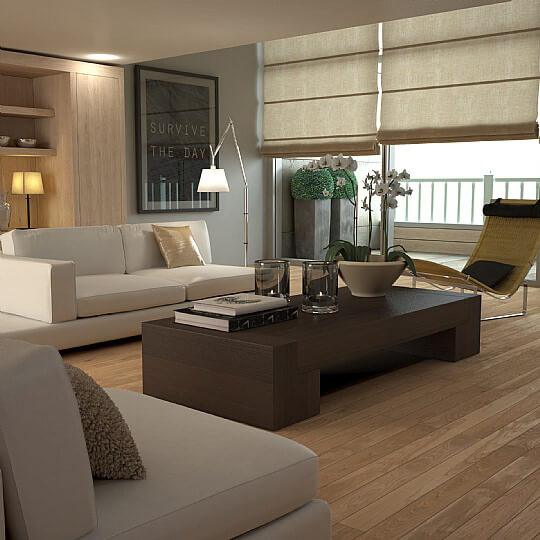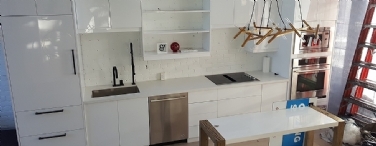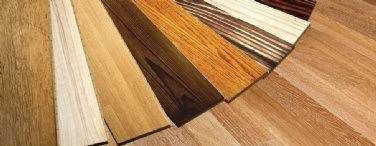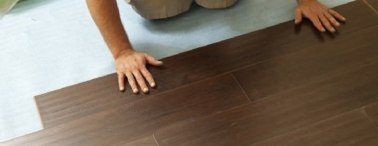A few days ago, this article was posted comparing hardwood flooring to laminate flooring. Due to the vast differences between solid and engineered hardwood, it was thought best to save this for another article. Applauding certain readers for their attention to detail, that last article was not intended to be a final chapter in the comparison of flooring options.
As the planned follow-up to that article, the goal of this article is to inform readers on the important differences that exist between solid hardwood and engineered hardwood. It is clear that some readers already understand the important differences that exist, but to best convey the information, it has been broken down into three parts. First, consider solid hardwood, second, consider engineered, and finally, compare the two side by side.
Solid Hardwood
When most individuals think of solid hardwood flooring, the 2 ¼ inch wide by ¾ inch thick oak panels are what come to mind. In truth, solid hardwood floors can range from 5/16 inch thick to ¾ inch thick. For width, they vary from 2 ¼ inch to 6 inches. What really makes solid hardwood solid is that it is cut from a solid piece of wood.
This feature is what mainly allows solid hardwood floors to easily be sanded and refinished should damage occur. At the same time, it is this same feature that gives solid hardwood its biggest weakness. Because it is made from a single piece of wood, solid hardwood does not handle humidity very well.
For this reason, it should not be installed below ground level, such as in a basement, and also should not be installed directly over concrete. When installation is desired on concrete, some prepping is first required. One suggestion for this would be to first cover the floor with a rubber moisture barrier, then place a thin layer of plywood, followed by some black felt paper. This should serve as a sufficient barrier, and allow the installation of solid hardwood over concrete.
If you desire hardwood in a basement, simply avoid solid hardwood entirely, as the humidity level found below base level is never desirable. No matter where you install the wood floor, leave room for morphing to occur, because humidity will affect it.
Besides this weakness to humidity, hardwood floors make a beautiful addition to any home, and there are about as many hardwood floor varieties as there are tree varieties. In addition to their beauty, what really sets solid hardwood apart is the fact that, with proper care, these floors can last upwards of 100 years.
Engineered Hardwood
Manufactured with multiple layers, engineered hardwood is known best for being cheaper and more humidity tolerant than its solid counterpart. Like solid hardwood, engineered hardwood comes in a variety of sizes, thicknesses and varieties. The feature that defines engineered hardwood as engineered is that it is composed of multiple layers of different woods, known as ply layers.
These ply layers can be as few as 3 or as many as 12. On top of the ply layer, there is a solid wear layer, which is why people see when the hardwood floor is installed. Contrary to what some believe, engineered hardwood is not just the cheap hardwood. Like most other consumer products, it comes in a variety of qualities, and like solid hardwood can be as simple as red oak, or as exotic as a rare African tree.
Unlike solid hardwood, the ply layers and the manufacturing process involved in engineered hardwood allows it to be much more resilient to humidity. As such, engineered hardwood can be installed without issue in just about any room of the house, including sublevels. Similarly, engineered hardwood can be installed directly over a concrete floor, though you may still want to add a black felt barrier, or something similar.
Though engineered floors do have some clear advantages over solid hardwood, the one area where it does suffer is longevity. Even the thickest wear layer on an engineered hardwood floor will last no more than maybe 80 years. Though this isn't a concern for most home owners, it is a factor to consider in the long run, especially if the house could be passed down to the next generation.

The Comparison
Looking at the two different options side by side, here are some things to consider:
- Humidity: Engineered hardwood performs much better under high humidity. Solid hardwood is known to warp and expand, especially if humidity exceeds 60% or so within the home.
- Price: Engineered hardwood tends to be cheaper. Since solid hardwood is cut from a single piece, it usually will have more value. The exception to this would be comparing a basic solid hardwood against a rarer engineered hardwood.
- Quality: Overall, solid hardwood is of a higher quality. Engineered hardwood is still a great option, but all other things being equal, having that solid piece offers higher quality flooring.
- Longevity: Solid hardwood has a naturally thick wear layer that can be sanded down and refinished, making it the winner in this category. The longest lasting engineered hardwood will have a tough time making it past 80 years, whereas some high quality, solid hardwoods have been known to last more than 100 years.
Solid or Engineered Hardwood - Which One is Right for You?
Unfortunately, there is no simple answer to this question. Your budget, the style of your home, and your own personal preference can all affect the answer. The one exception to this would be if humidity is an issue, in which case you definitely want to install engineered hardwood.
As said earlier, solid hardwood should never be installed in basements or directly on concrete. If the environment is a major concern of yours, you might also want to avoid hardwood, as it requires as much as four times the amount of trees to make the same amount of flooring. The truth is, engineered hardwood can be just as beautiful as solid hardwood, so unless you are tied to the traditional option, never feel shame from going with the engineered alternative.
Got questions? Ask the pros on TrustedPros Forum!
Posted by: Ahmed Muztaba





